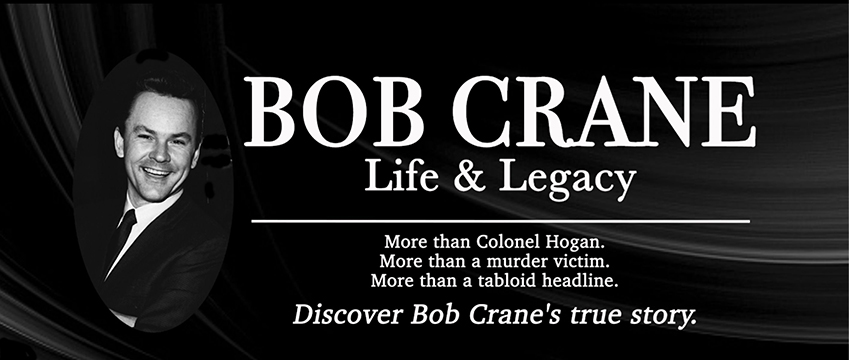Happy Hanukkah and warmest holiday wishes with the start of the Festival of Lights!
While Bob Crane was Irish Catholic, many of the cast members of Hogan's Heroes were/are Jewish, including Werner Klemperer, John Banner, Robert Clary (who spent three years in a concentration camp as a teenager), Leon Askin, and Howard Caine. None of the actors were offended by the series because they appreciated it as a well-written parody and a way of fighting back with humor.
 |
| John Banner, Robert Clary, and Bob Crane share a scene in Hogan's Heroes. |
From its inception, Hogan's Heroes was drenched in controversy, mostly because those who did not watch the series were confused about its premise. Even today, people believe that the series takes place in a concentration camp, and thus, is inappropriate, inexcusable, and politically incorrect. After all, how on earth can that be funny?
The truth is, you can't make fun of the Holocaust and concentration camps. But Hogan's Heroes does nothing of the sort. It is a situation comedy set in a prisoner of war camp, and in ways that echo Mel Brooks' The Producers and Charlie Chaplin's The Great Dictator, the writers, directors, producers, and actors did make fun of the Germans - and more specifically, the Nazis - but never the war itself or its serious implications. And in some ways, it was quite therapeutic to many of its stars, all of whom were affected by World War II and the Nazis in some way in their personal lives.
"I think we make great fools of the Germans," Robert Clary said in a 1966 interview. "We are laughing at them."
The truth is, you can't make fun of the Holocaust and concentration camps. But Hogan's Heroes does nothing of the sort. It is a situation comedy set in a prisoner of war camp, and in ways that echo Mel Brooks' The Producers and Charlie Chaplin's The Great Dictator, the writers, directors, producers, and actors did make fun of the Germans - and more specifically, the Nazis - but never the war itself or its serious implications. And in some ways, it was quite therapeutic to many of its stars, all of whom were affected by World War II and the Nazis in some way in their personal lives.
"I think we make great fools of the Germans," Robert Clary said in a 1966 interview. "We are laughing at them."
Bob Crane concurred in a July 20, 1968, interview: "I've had people ask me, 'How can you make fun of a concentration camp? Think of all the Jews who were killed.' Well, ours isn't a concentration camp; it's a camp filled with soldiers who are prisoners. And their situations can be funny."
"Besides," Clary stressed, "the difference between a prisoner of war camp and a concentration camp is the difference between night and day."
Further, Hogan's Heroes can easily be considered the older brother of M*A*S*H. Many of the writers, directors, and actors who worked on Hogan's Heroes went on to work on M*A*S*H. In similar ways, Hogan's Heroes and M*A*S*H started out campy and light. As both matured over the seasons, the storylines became more serious and character development grew deeper. Hogan's Heroes ran for six seasons and was criticized as lasting longer than World War II itself. Yet, by season six, the episodes, while still very funny, had taken on more serious undertones than what as originally produced in season one. M*A*S*H ran for a mammoth eleven seasons, from 1972 to 1983, one of the longest running sitcoms in history. By the time the series wrapped, the storylines were far from funny, and the series had morphed from a half-hour sitcom into a half-hour drama with moments of dry humor.
Next time you watch either Hogan's Heroes or M*A*S*H, take note of the writing styles and character development across the seasons. You are sure to see some overlap!
Further, Hogan's Heroes can easily be considered the older brother of M*A*S*H. Many of the writers, directors, and actors who worked on Hogan's Heroes went on to work on M*A*S*H. In similar ways, Hogan's Heroes and M*A*S*H started out campy and light. As both matured over the seasons, the storylines became more serious and character development grew deeper. Hogan's Heroes ran for six seasons and was criticized as lasting longer than World War II itself. Yet, by season six, the episodes, while still very funny, had taken on more serious undertones than what as originally produced in season one. M*A*S*H ran for a mammoth eleven seasons, from 1972 to 1983, one of the longest running sitcoms in history. By the time the series wrapped, the storylines were far from funny, and the series had morphed from a half-hour sitcom into a half-hour drama with moments of dry humor.
Next time you watch either Hogan's Heroes or M*A*S*H, take note of the writing styles and character development across the seasons. You are sure to see some overlap!
